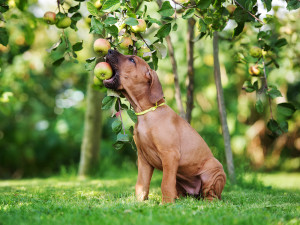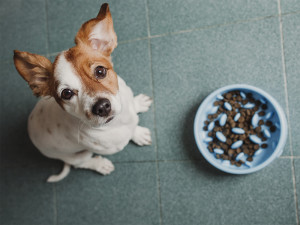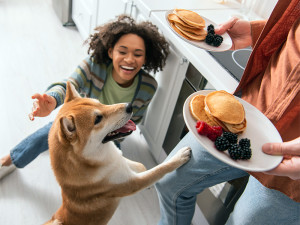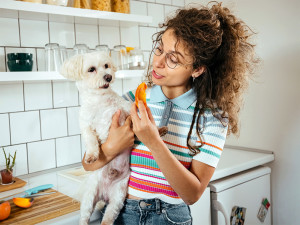Can Dogs Eat Pears?
It can be a fruit with an acquired taste, but can your pup... acquire it?

share article
A perfectly ripe pear hits differently; it’s sweet, juicy and so perfectly soft. If you are lucky enough to catch a pear when it’s ripe, you may be wondering if you can share some with your pup.
The good news is that pear fruit is safe and non-toxic for dogs and can be a good occasional snack or treat in moderation. Read on to learn all about pears and your pup.
Nutrition facts about pears for dogs
There are many varieties of edible pears available in grocery stores and growing worldwide with similar nutritional benefits. Most pears come from the Pyrus communis tree. Pear trees are native to parts of Europe and Iraq with many varieties grown worldwide.
The pear is the fruit of the tree, containing many important nutrients including fiber, sugar, vitamin C, potassium, copper, iron, and calcium. Dogs can benefit from many of these nutrients, aside from vitamin C. Unlike us, dogs actually synthesize their own vitamin C and do not need to get it from their diet.
Are pears good for dogs?
Pears can provide some valuable health benefits to dogs, however, they are not a necessary part of a dog’s diet and contain a lot of sugar, which can be unhealthy in large amounts. Some of the benefits pears provide include:
Fiber: Pears, especially the skin, contain a large amount of both soluble and insoluble fiber. These carbohydrates are not digested but serve an important role in bulking up the stool, preventing constipationopens in a new tab, and providing critical nutrients to the gut microbiomeopens in a new tab.
Minerals: Pears contain many important minerals including potassium, copper, iron and calcium. These minerals are necessary for everyday biological functions including heart health, maintenance of normal blood pressure, muscle function, brain development, immune functions, and red blood cell production and function.
Water content: Pears are very juicy and contain a large amount of water. This makes for a great snack on hot daysopens in a new tab, and other times, you need your dog to stay hydrated such as after vigorous exercise or play.
Can dogs eat all parts of the pear?
Dogs should stick to eating the flesh of the fruit and not eat whole pears for a number of reasons. The skin of the pear is edible, but it contains a large amount of fiber which can cause digestive upset if your dog is not accustomed to it. Also, the seeds of the pear should not be ingested as they contain small amounts of the toxin cyanide. This comes from a compound called Amygdalin, a cyanogenic glycoside found in the seeds.
The risk of toxicity to dogs is very low in most cases since the seeds have to be crushed to release the toxin, and they would have to eat a very large amount of seeds in order to experience toxic effects. However, it’s best to avoid the risk. Finally, eating large pieces of pear, especially if they are hard and not fully ripe can be a choking hazardopens in a new tab or put them at risk for intestinal blockages. Be sure to offer your dog only soft, ripe pears that have been cut into bite-sized pieces.
Are pears completely safe for dogs?
Pear fruit is safe for dogs in most cases but there are a few important points to keep in mind:
Beware of cyanide toxicity: Pear seeds and branches of the pear tree contain small amounts of a toxic compound called amygdalin that is converted to cyanide in the body. A dog would have to ingest a very large amount of seeds or branches to experience toxic effects but it is a good idea to prevent them from eating these parts.
Avoid moldy fruit: Moldy or rotten fruit can contain mold spores that are also potentially toxic, known as tremorgenic mycotoxins. If you have a pear tree on your property, keep your dog away from fruits that are moldy or rotten on the ground, and be sure to dispose of any rotten fruit in your home so that it is out of reach of your dog.
Go slow with fiber: While fiber has many excellent health benefits, too much fiber given too suddenly can also cause digestive upset including bloating, gasopens in a new tab, and diarrheaopens in a new tab. If your dog is not used to eating lots of fiber, start gradually with just small bites of the pear flesh and see how they tolerate it.
Avoid excess sugar: Pears contain a lot of sugar which is not healthy for dogs in large amounts. Excess sugar in their diet can lead to weight gain and put them at risk for health problems like diabetesopens in a new tab, obesity, and arthritisopens in a new tab. Be sure to keep sweet treats to a minimum.
The bottom line: Can dogs eat human food?
Dogs can eat lots of human foods and this can be a great way to enrich your dog’s diet as well as being a great motivator for training sessions. It is important to keep in mind that dogs do have unique nutritional needs, however, and the bulk of their diet needs to come from a complete and balanced dog food in order to prevent any potentially serious deficiencies. In addition, too many treatsopens in a new tab and table snacks add unnecessary calories to their diet and this can put them at risk for weight gain.
Be sure to factor treats into their daily caloric intake and keep them to less than ten percent of their total diet. Finally, make sure to double-check that whatever foods you plan to share with your pup are safe and non-toxic to dogsopens in a new tab. There are a surprising number of foods that are not safe for dogs, whether they are actually toxic or just unhealthy for them. If in doubt, be sure to speak with your vet or call a pet poison hotline to confirm that a food is dog-safe before sharing it with your pup.
Other foods that are safe for dogs
These superfoodsopens in a new tab can be safe and healthy in moderation.
Fruits and veggiesopens in a new tab like these can also be good choices for your pup.
Peanut butteropens in a new tab can also be a tasty snack for your dog if you stick to these guidelines.
Other foods that are dangerous
Grapes are considered toxicopens in a new tab to dogs and cannot be shared.
Any dishes with garlic, onions, or these other toxinsopens in a new tab are also a no-no.
Avocado should also be avoidedopens in a new tab due a toxin called persin.
FAQs (People also ask)
How much pear can a dog eat?
Treats like fruit should be less than ten percent of a dog’s caloric intake. Start with small portions as this is also a high fiber food.
Is it OK to give dogs pears?
Pear fruit is safe for dogs in moderation.
Why do dogs like pears?
Dogs may like the sweet flavor of pears as well as the juicy texture. Not every dog will like them, however.
Can dogs eat pears?
Yes, pears are safe for dogs in small amounts.
Can dogs eat whole pears?
Dogs should not eat the seeds of the pear or too much of the skin if they are sensitive to fiber.
Are pears safe for dogs?
Pear fruit is safe for dogs; avoid unripe fruit, rotten fruit, and pear seeds which can be toxic in large amounts.
References:
Harvard School of Public Health: The Nutrition Source: Copperopens in a new tab
Merck Manual: Tremorgenic Neuromycotoxicosisopens in a new tab
North Carolina State Extension: Pyrus Communisopens in a new tab
Tufts Veterinary School Clinical Nutrition Service: The ABC’s of Vitamin Copens in a new tab

Dr. Amy Fox, DVM
Amy Fox, DVM is a small animal veterinarian in New York City. A lifelong animal lover, Dr. Fox studied biology in college and then worked as a veterinary nurse before pursuing veterinary school at Cornell University. She has worked in many different settings including shelter medicine, emergency medicine, general practice, and animal cruelty and forensics. She is especially interested in nutrition, preventative medicine and care for senior pets. Dr. Fox also enjoys writing about veterinary medicine and teaching. In her free time she loves to cook, garden, and go for long runs.
Related articles
![Happy couple cooking dinner with dog watching.]() opens in a new tab
opens in a new tabCan Dogs Eat Garlic?
Like vampires, they should stay far away. Here’s why.
![Puppy looks up while sitting next to a puzzle toy with food.]() opens in a new tab
opens in a new tabHow to Slow Down a Dog Who Eats Too Fast
Plus 6 stylish slow-feed dog bowls.
- opens in a new tab
Can Dogs Eat Blackberries?
The yummy treat is safe and full of antioxidants.
![Woman in the kitchen with her dog.]() opens in a new tab
opens in a new tabCan Dogs Eat Persimmons?
There are some caveats to be aware of.
![Woman holding basket of cherries next to large brown dog.]() opens in a new tab
opens in a new tabCan Dogs Eat Cherries?
Find out if the yummy fruit is safe to share.
- opens in a new tab
Can Dogs Eat Mango?
The delicious fruit is safe in moderation.









